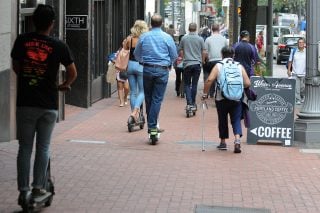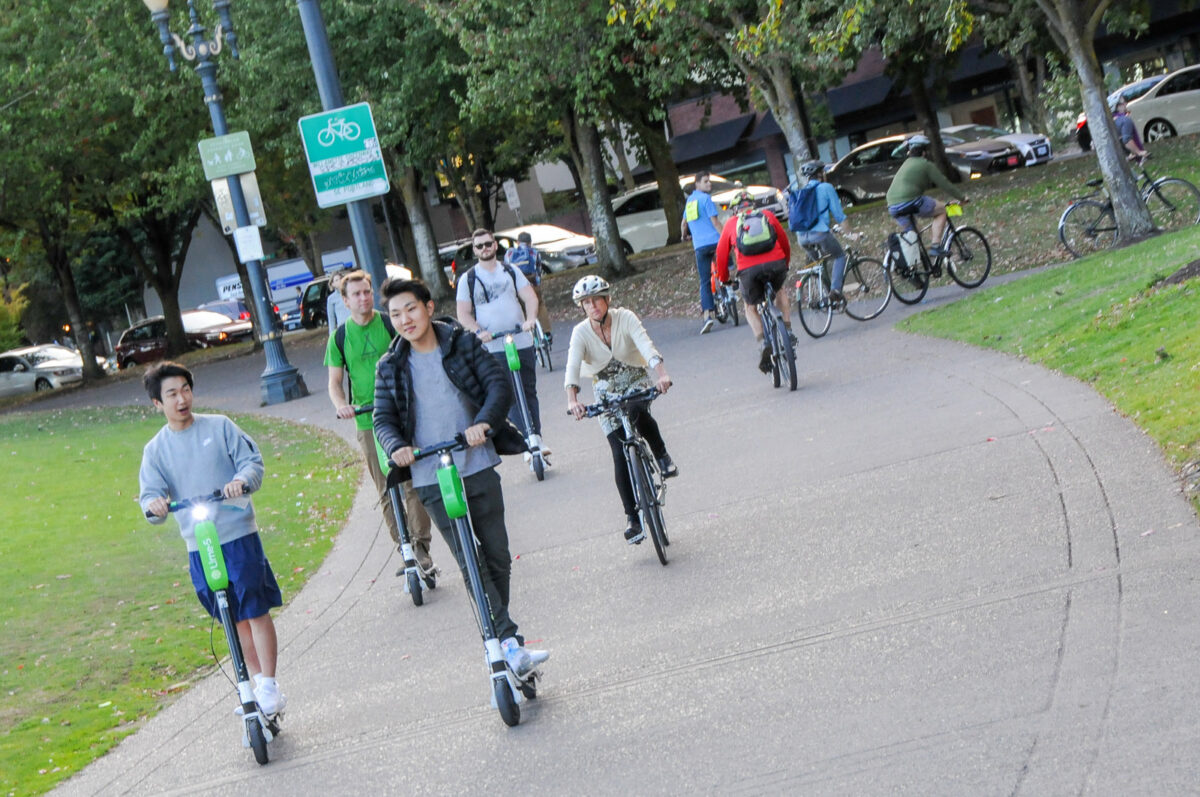
(Photos: BikePortland)
Portland’s second attempt at integrating electric scooters into the mobility mix could get started as early as April 26th.
And unlike the 2,000 scooters we had on the streets last year, the Portland Bureau of Transportation will start with 2,500 and estimates we could see as many as 9,000 if enough scooter companies play ball with a host of new regulations. PBOT says if all permits are granted and all operators qualify for incentives we could have 15,000 scooters in use by January 2020.
The new pilot is scheduled to last one year, after which PBOT says they’ll work with the public to develop a permanent program.
In their announcement today, PBOT released a mix of incentives and regulations that demonstrate the challenge they face to create a scooter program that leads to high ridership yet also addresses serious concerns raised by some people and organizations during the first pilot. At nearly 6,000 trips per day during the 120-day pilot last year, the scooters proved to be a valuable mobility option. However, due to a lack of safe space to ride them and a lack of consideration for others, too many people rode them on sidewalks and parked them in places that obstructed public right-of-way.
Earlier this month PBOT was sent a letter and threatened with legal action by Disability Rights Oregon over concerns about scooters being parked on sidewalks. In response, PBOT has developed a system of carrots and sticks that puts the onus on riders and scooter operators to fix that problem.
Advertisement

PBOT will mandate a 25 cent “street use fee” be added to each scooter fare. Revenue from that fee will be added to a 5 to 20 cent “right-of-way fee” (based on where the rental takes place) charged to scooter companies in order to “generate funding to build safe places for people to use e-scooters, such as protected bike lanes and neighborhood greenways.”

The more a company does to prevent riders from riding and parking on sidewalks, the more scooters they’ll be allowed to release (and the more money they can make). PBOT is offering a 20 percent increase in the size of a company’s fleet if they, “implement innovative technology or business practices that eliminate sidewalk riding.” PBOT will also award more points to a company’s permit application if they offer scooters that can be locked to public bike racks (instead of sidewalks or ADA ramps).
When it comes to accessibility, PBOT will allow operators to introduce scooters with seats.
As for riders who flout traffic laws, PBOT will make operators responsible for issuing warnings and fines to account holders who aren’t riding legally. In today’s announcement, PBOT said they’ll employ “regulatory specialists” who will monitor sidewalks and illegal riding and then forward that information onto operators. After a warning, a rider could get a fine of $50 for sidewalk riding or $15 for illegal parking.
These sidewalk fines are likely to raise attention of transportation and social justice advocates. The Portland Police Bureau has a problem with racial bias and PBOT’s own Vision Zero Task Force recommended against increased enforcement of automobile due to racial profiling concerns. It remains to be seen how illegal sidewalk riding will be enforced without singling out people based on how they look. (And remember, many people ride on the sidewalk because they feel they will be killed or seriously hurt while sharing streets with auto users.)
Another area of concern last time around was the use of scooters in Portland Parks properties like the Eastbank Esplande and Waterfront Park. It was technically illegal (no motorized vehicles allowed in parks), but many people did it anyways. To limit access to these areas, PBOT says they will require companies to use “geofencing” technology that prevents riders from ending a trip and parking in Waterfront Park.
To encourage availability in east Portland, companies will be allowed to increase the number of scooters in their fleet by 35 percent if they meet or exceed 2-3 trips per scooter per day. A minimum of 15 percent of a company’s total scooter fleet must be deployed east of I-205 (that’s down from a 20 percent minimum last pilot).
Permit applications are due April 9th and PBOT will notify finalists April 18th.
— Jonathan Maus: (503) 706-8804, @jonathan_maus on Twitter and jonathan@bikeportland.org
Never miss a story. Sign-up for the daily BP Headlines email.
BikePortland needs your support.


